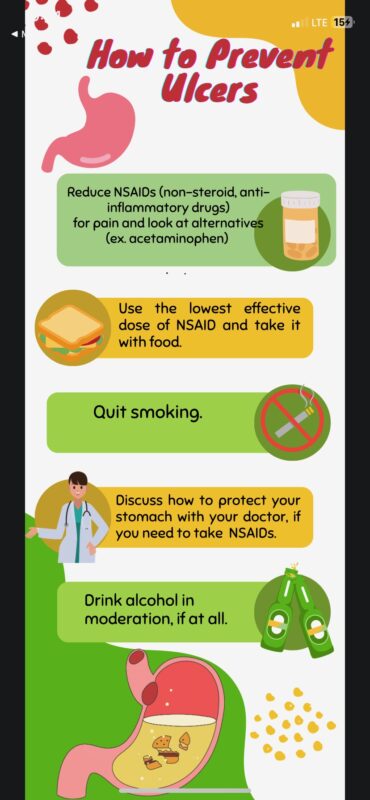When Bruce Springsteen recently postponed his concerts because of peptic ulcer disease, many fans wondered what this health issue really means.
Key Points
- Peptic ulcer disease occurs when open sores, or ulcers, form in the stomach or first part of the small intestine.
- Many peptic ulcers develop because a bacterial infection eats away the protective lining of the digestive system.
- People who frequently take pain relievers such as ibuprofen or aspirin are more likely to develop ulcers.
- Most peptic ulcers heal with the right treatment plan.
What is peptic ulcer disease?
Peptic ulcer disease means ulcers in the stomach or small intestine. The word “peptic” means that the problem is caused by acid.
An ulcer is an open sore that is carved out in the lining of the stomach or small intestine.
Normally, a thick layer of mucus protects the stomach lining from the acid of its digestive juices. Many things can reduce this protective layer, allowing stomach acid to damage the tissue.
What are the symptoms?
Symptoms of peptic ulcer disease include:
However, not all stomach pain means there’s an ulcer. Sometimes, there may not be any symptoms at first.
More serious symptoms can include black stool, weight loss and severe pain. Many people with ulcers have no symptoms at all.
Causes/Risk Factors
The two most important causes of ulcers are:
- Infection with a bacteria called Helicobacter pylori, also called H. pylori or “HP” that lives in the digestive tract. This type of bacteria eats away at the protective stomach lining.
- “The other major cause of peptic ulcer disease is drugs in the class called NSAIDS – non-steroidal anti-inflammatory drugs. So, things like Ibuprofen, naproxen, or even low-dose aspirin can cause peptic ulcers,” explains Scott Gabbard, MD, gastroenterology specialist for Cleveland Clinic.
Who is at-risk for ulcers?
One in 10 people are likely to develop an ulcer. The risk factors include:
- Frequent use of nonsteroidal anti-inflammatory drugs (NSAIDs), a group of common pain relievers that includes ibuprofen (Advil® or Motrin®).
- A family history of ulcers.
- Illness such as liver, kidney or lung disease.
- Regularly drinking alcohol.
- Smoking

Diagnosis
Today, most ulcers are diagnosed using a procedure called an EGD (EsophagoGastroDuodenoscopy.)
During an EGD, a special lighted camera on a tube is inserted through the mouth into the stomach and small intestine. Even small ulcers can be found with this procedure.
They can be photographed, biopsied and even treated if bleeding is present.
Myth Buster
There are many myths about peptic ulcers that have built up over the years. For example,
- Ulcers are not caused by “stress” or by worrying.
- Spicy foods do not specifically cause ulcers.
- Certain foods may irritate an ulcer that is already there, however, those foods probably are not the cause.
Getting Well
Although ulcers sometimes heal on their own, but check with a doctor if there are warning signs.
Without treatment, ulcers can lead to more serious health problems like internal bleeding, anemia or even cancer.
“We have fantastic treatments for peptic ulcer disease. It’s incredibly responsive to therapy,” said Dr. Gabbard.
“If you’re found to have H. pylori, then the treatment course is a 14-day course of antibiotics, plus an anti-blocking medicine, and that heals the majority of peptic ulcers due to H. pylori.”
Dr. Gabbard said for those who develop peptic ulcer disease from another cause, like using NSAIDS, then the course of treatment would be different, but it’s still just as effective.
Prevention and Final Thoughts
- Cut down on NSAID use, if possible. Consider acetaminophen as a substitute. Talk with your doctor if you need to take NSAIDs for certain medical reasons about how to protect your stomach lining.
- Reduce irritants from smoking, alcohol use and diet that may lead to too much stomach acid or eat away at your stomach lining.
- Take an H. pylori breath test to find out if you have overgrowth of the bacteria.
For more information about a healthy diet to prevent heartburn, GERD and acid reflux, check out the following resources:
The Gerd Diet from Johns Hopkins
Foods To Help Your Acid Reflux
Image by brgfx on Freepik

Thank you, You will be automatically subscribed to the our newsletter.